

Cao Long (right) competes at the Belt and Road International Climbing Master Tournament in Ningbo, Zhejiang province, on May 12, 2019. CHINA DAILY

Cao cheers with excitement after finishing with a time of 5.08 seconds in a selection round for the Hangzhou Asian Games in Hainan on May 8, 2022. CHINA DAILY
China's "Spider-Man" shares his passion for speed climbing and the pursuit of even greater heights, Chen Xue reports.
How fast can someone climb 15 meters — the height of a 5-story building? The answer is: within 5 seconds.
Before May this year, only two people in the world — Kiromal Katibin and Veddriq Leonardo, both Indonesian athletes — were able to complete the speed climbing route — a 15-meter-high artificial wall with foot and hand holds — within 5 seconds in official events. But on May 30, Chinese speed climber Cao Long hit the finish pad at 4.98 seconds in the semifinal of the first National Rock Climbing Championship, held in Keqiao, Zhejiang province. Cao became the third-fastest person in the world — vertically speaking.
But Cao himself doesn't care too much about the new nicknames given to him, such as "fastest man in China" or "Chinese Spider-Man".
"All of my teammates have the ability to do it, too. I just happened to have a bit more luck at that time," said the 23-year-old athlete of the China National Climbing Team and a senior student at China University of Geosciences (Wuhan).
According to Cao, the outcome of speed climbing can vary every time because it's a highly demanding and stressful sport. Unlike the other two climbing disciplines — lead climbing and bouldering, in which athletes take turns climbing the same routes — speed climbing is a competitive race where two climbers compete at the same time. It's also a sport that finishes in seconds, meaning that to succeed, everything has to be perfect — athletes should have the right amount of focus, confidence and courage to take risks. Any slipups could be disastrous in a sport where there are only milliseconds between victory and defeat.
"Keeping a level head is key. Everyone wants to win. But the more you want it, the more likely you'll mess up," said Cao. "But being too calm and trying to avoid any mistakes won't do you any good either because that mindset takes away your edge and your willingness to fight."
Cao noted, "You just have to find the right balance."
But this psychological pressure involved with speed climbing is, in fact, part of the reason why Cao loves the sport. "The tension of competing side by side with another climber really excites me," he said. "And I do enjoy the thrill when the outcome of a climb — be it during daily training or in an official competition — exceeds my personal best."
In fact, Cao's encounter with climbing was quite coincidental. At the age of 8, Cao was taking a taekwondo class when he noticed a climbing gym downstairs. He convinced his parents to let him have a try. Later, when the time came that he had to choose between the two, he picked climbing as it was more challenging in his eyes.
Like many kids who first get into climbing, Cao was mainly doing bouldering and lead climbing and was doing very well. He won a gold medal at the National Junior Climbing Championship when he was 10 and was certified as a national second-grade sportsperson when he was 14.
But not long after his certification, a severe accident happened. Cao fell from a 13-meter wall during training, breaking his lower back, left thigh, and dislocating his left wrist. After recovering from the accident, Cao went back to climbing despite protests from his family.
At the age of 18, Cao had to undergo another surgery after injuring his left arm in a competition.
It was after that surgery that Cao decided to give speed climbing a try because it requires different techniques from bouldering and lead climbing and puts less pressure on his previously injured body parts.
And it turns out that Cao was great at speed climbing as well, even though he thinks he is hardly the strongest athlete.
"When it comes to pull-ups, squats or dead lifts, I'm definitely not the one who can lift or pull the heaviest weight," he said.
"But I guess I'm better at carrying momentum and knowing the subtleties of each move, and I know how to better distribute power to different parts of my body."
Unlike the other two climbing disciplines — where routes are changed regularly and every competition is different — speed climbing routes are identical everywhere in the world, which means that climbers train on the exact same route every day. However, Cao doesn't find it to be boring.
"Training with my teammates makes it fun and exciting. And our coach Zhong Qixin, a five-time world champion, comments on each of our climbs and advises us on how we can improve," said Cao. "Also, advanced technology used to monitor our physical state and body data allows us to train more efficiently and effectively."
Now, Cao is training with the team at the Huairou National Mountaineering Training Base in Beijing, preparing for the Hangzhou Asian Games in September and the Paris Olympics in 2024. In his eyes, the national record of 4.98 seconds that he made a little over a month ago has become a thing of the past.
"As excited as I was at the result, it was just a one-time thing. The titles won't always stay with me if I just settle for what I have achieved up to now," said Cao. "I'll keep striving to do better and outdo myself."
Contact the writer at chenxue@i21st.cn
《中国日报》 2023年7月5日 记者 陈雪
![]() 鄂公网安备 42011102004169号
鄂公网安备 42011102004169号